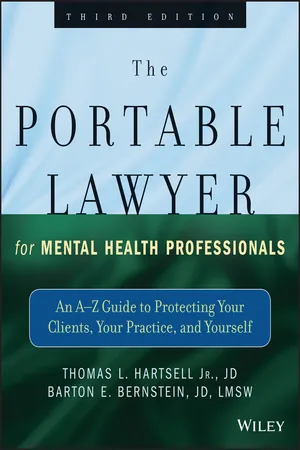
The Portable Lawyer for Mental Health Professionals
An A-Z Guide to Protecting Your Clients, Your Practice, and Yourself
- English
- ePUB (mobile friendly)
- Available on iOS & Android
The Portable Lawyer for Mental Health Professionals
An A-Z Guide to Protecting Your Clients, Your Practice, and Yourself
About this book
Everything you need to legally safeguard your mental health practice
Fully revised, The Portable Lawyer for Mental Health Professionals, Third Edition identifies, explores, and presents solutions to both the simple and complex legal questions that mental health practices must deal with daily. Written by Thomas Hartsell Jr. and Barton Bernstein—attorneys and therapists specializing in legal issues concerning mental health—this essential guide arms professionals with the expert knowledge needed to avoid a legal violation, or to know how to handle a situation if a complaint is filed.
With downloadable sample forms and contracts—including the new Informed Consent for Psychological Testing and Professional Limited Liability Member Agreement forms—this complete resource features step-by-step guidance, helpful case studies, and "legal light bulbs" to alert clinicians to warning signs and help them steer clear of legally questionable situations.
New to the Third Edition:
- Coverage of how to conduct business in a digital world, including how to handle confidentiality issues surrounding electronic health records and cloud computing, distance therapy, and maintaining a professional client-therapist relationship in a Facebook world
- Vital information on a variety of associations' ethics guidelines
- A look at the Health Information Technology for Economic and Clinical Health (HITECH) Act
- Considerations for using or not using evidence-based treatments
- New information on working with minors and dealing with homicidal clients
Convenient and comprehensive, The Portable Lawyer for Mental Health Professionals, Third Edition is the quick-reference resource that mental health professionals, graduate students, attorneys, and clients alike can rely on to make informed legal decisions.
Frequently asked questions
- Essential is ideal for learners and professionals who enjoy exploring a wide range of subjects. Access the Essential Library with 800,000+ trusted titles and best-sellers across business, personal growth, and the humanities. Includes unlimited reading time and Standard Read Aloud voice.
- Complete: Perfect for advanced learners and researchers needing full, unrestricted access. Unlock 1.4M+ books across hundreds of subjects, including academic and specialized titles. The Complete Plan also includes advanced features like Premium Read Aloud and Research Assistant.
Please note we cannot support devices running on iOS 13 and Android 7 or earlier. Learn more about using the app.
Information
Chapter 1
Clinical Notes
Clinical Records/Clinical Notes Must Be Maintained
- Therapist shall base all services on an assessment, evaluation, or diagnosis of the clientThis standard would suggest that therapists must maintain notes that contain clinical information and the rationale for the assessment, evaluation, and diagnosis of the client. It also implies that the treatment plan should be supported by the same factors.
- Therapist shall evaluate a client's progress on a continuing basisThe notes on each client must be maintained and updated throughout the treatment process. All changes in the assessment, evaluation, prognosis, and diagnosis, as well as the treatment plan, are updated continuously, as long as the client is in treatment. When terminated, the record should record the reason for termination.
- For each client, therapist shall keep records of the dates of services, types of services, and billing informationRoutine, accurate billing records and third-party payment forms provide the means of fulfilling this requirement.
- Therapist shall not disclose any confidential information but will take reasonable action to inform medical or law enforcement personnel if the professional determines that there is a probability of imminent physical injury by the client to the client or others, or there is a probability of immediate mental or emotional injury to the client.
Can Clinical Records and Notes Be Protected?
Table of contents
- Cover
- Title Page
- Copyright
- Dedication
- Sample Forms
- Preface
- Acknowledgments
- Section One: Clinical Records: Protected or Not
- Section Two: Confidentiality
- Section Three: Contracts
- Section Four: Fees
- Section Five: Forensic Issues
- Section Six: Practice Models
- Section Seven: How to Avoid Malpractice Charges
- Section Eight: Managed Care
- Section Nine: Teamwork
- Section Ten: Unusual Practices
- Section Eleven: Federal Regulations, HIPAA, and HITECH
- Appendix A: Bylaws for an IPA
- Appendix B: Partnership Agreement
- Appendix C: Articles of Incorporation: Professional Corporation
- Appendix D: Articles of Incorporation: General Corporation
- Appendix E: Certificate of Formation of a Professional Limited Liability Company
- Appendix F: Professional Limited Liability Company Member Agreement
- Appendix G: Sample Business Associate Contract
- Appendix H: Business Associate Contract (Attorney Services)
- Appendix I: Authorization for the Use and Disclosure of Protected Health Information
- Appendix J: Client Information Amendment Form
- Appendix K: Notice of Privacy Practices of Susan A. Jones, LPC
- Appendix L: Accounting of Disclosures of Protected Health Information
- Appendix M: Request for Accounting of Protected Health Information Disclosures
- Appendix N: Authorization Revocation Form
- References and Reading Materials
- Author Index
- Subject Index